Wondering what life is like living in Tianjin, China as an ex-pat teacher? In this TEFL interview, we have Katie and Calum to tell you everything you need to know before you make the move!
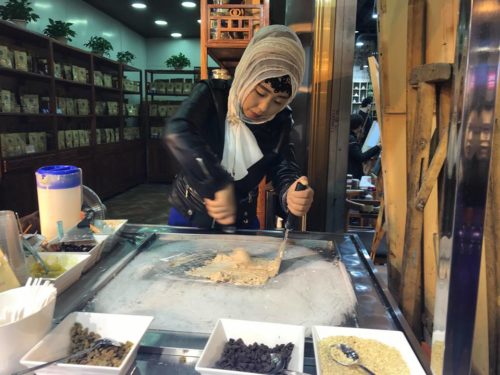
Disclosure: Untold Wanderlust contains affiliate links. If you click on these links and make a purchase, we will earn a small commission at no extra cost to you. You can find our full disclosure policy and privacy policy here.
Country specifics
Which country are you teaching in/ have taught in?
I am currently a Primary school teacher in a city called Tianjin, on the outskirts of Beijing in China. We chose China because we had travelled in China extensively back in 2013 and fell in love with so many aspects of the lifestyle here. After two years, we are moving later this year to work in Bangkok.
What is required to teach at international schools in China?
As I am from the UK and work at British International Schools, I had to have a degree and Post Graduate Degree in Education (PGCE) to work abroad.
What is the best thing about life in Tianjin, China?
Convenience! There are so many aspects of our life in China that is incredibly easy. Anything and everything can be delivered to your door within an hour; from groceries to medicine, flowers to takeaways. The app WeChat is life here and you can use it for everything; we pay our bills on the app, book cinema tickets on the app, order our takeaways on the app, and use it to pay in restaurants, stores even street vendors. Didi is China’s version of Uber and makes like even more convenient. The app is super easy to navigate, and taxis are cheap. Plus, the app is in English and can translate any messaging between you and the driver into English for you. There are some really helpful apps in China that make tasks and errands simple and quick.
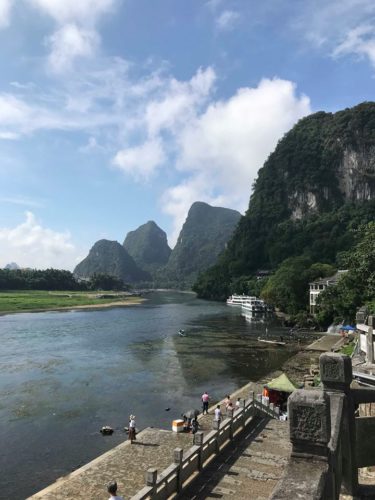
What is the worst thing about living in Tianjin, China?
Pollution. Tianjin is in North-Eastern China and because of its surrounding factories and proximity to Beijing, the pollution can be bad. The average air quality index (AQI) in major cities in America sits between 20 – 60 AQI whereas, in Tianjin, it is a very good day if the AQI is under 100. Anything over 200 is a challenge, my husband and I can get dizzy and demotivated and it really is the main reason we are leaving China this year.
Is there a big ex-pat community? Is it easy to make friends?
In Tianjin, there are very few ex-pats; mainly the people I work with and a few families who are here because of business. You will find more ex-pats in the bigger cities like Beijing, Shenzhen or Hong Kong but it can be difficult to make friends outside of your work circles. I am lucky to have my husband living here with me and have some wonderful work friends.
What is the cost of living in Tianjin, China?
China can be as cheap or as expensive as you want it to be. We live in a two-bedroom apartment in the city centre which costs 9500 RMB per month. Apartments on the outskirts of the city can be as low as 3000 RMB. We eat out or order in more than we cook because it actually works out cheaper and with our busy lifestyle of work and blogging, we prefer to keep the cooking minimal. Average meals for two including a beer each will cost around 100 RMB for local food or 250-400 RMB for Western meals.
In local bars, expect to pay around 10 RMB for a bottle of local beer and up to 25 RMB for imported beer. Cocktails and wine tend to range between 20 – 50 RMB. We spend around 300 RMB a month on electricity and have so far paid around 10 RMB for over a year’s worth of tap water! We buy water tanks which cost us 10 RMB for a 5L tank. Some Western products can be found here but expect to pay more than you would in your home country.
The cost of travel in China is more expensive than most areas in South East Asia, speed trains are easy to book using Ctrip but avoid public holidays to get the best price.
Moving abroad
How did you find your teaching job?
In the UK, we have a website called TES – it is used to advertise UK jobs but also international positions. I applied for a few jobs in China, had interviews via Skype and chose my current school.
How did you find your accommodation for living in Tianjin?
My contract includes accommodation so all of that part of moving abroad was done for me. We were told we would be in a two-bedroom apartment and when we arrived in Tianjin, a driver took us straight to our apartment. We met the headteacher and our estate agent and were shown around our apartment.
Did you get culture shock? How did you overcome this?
Yes and no. The first few weeks were exciting and new and strange and we enjoyed exploring our neighbourhood. After a few months, however, things did start to feel strange. When the winter came, the pollution got worse and that was a challenge. There are still things now that confuse or sometimes make us feel uncomfortable. I suffer from anxiety at times which is definitely heightened living in China.
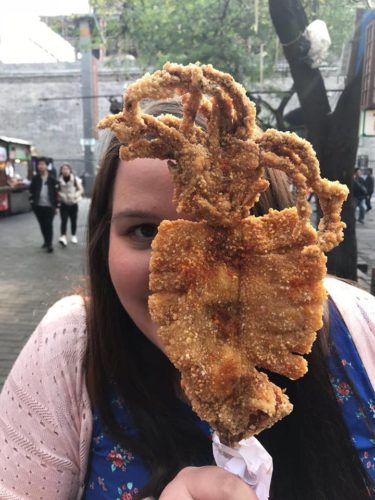
The best way I deal with culture shock and life in China is to take each day as it comes and do what makes us happy. I learned a little Mandarin to make communication a little easier, I have an amazing teaching assistant who has taught me how to use all the apps you could need to live here and that massively helped our day-to-day life.
In the classroom
Which grade(s) do you teach?
I teach year 5 which is the same as grade 4 in the US.
On average how many students are in the class?
I have 16 children in my class, 4 children are new to learning English (two of which have started this year) and 3 other children need additional support with vocabulary.
Do you have a TA? Do you find your TA useful?
I have an amazing teaching assistant. As I mentioned above, she helped make my life in China easier and more comfortable and is always there if I get stuck with something. Because she is a local member of staff, she is always great with translating certain keywords (many of our children are Chinese) but she is also a qualified teacher in China meaning she is fantastic at working with groups, covering the class if I have parent meetings and is just generally amazing.
What classroom materials and tools are available?
As an International school, we have a lot of materials and tools available. Our year group has a set of laptops and a set of iPads to use in class, our school has a full library, classrooms have book corners, we have an art station and all the usual materials you would see in a classroom.
What is your favourite classroom game?
The Pirate game. This isn’t one I created but the Pirate game is similar to battleships with children plotting different numbers and symbols on a grid. The teacher reads out the coordinates of the grid and they cross each square off. If the box has a number, that is money that goes into their cash and each symbol has different actions such as “swap scores”, “give a gift” or “skull and crossbones”. If you search “The Pirate Game TES” then you can download the worksheet from TES for free. My students LOVE it and it is an inclusive activity that helps children learn coordinates, and practice addition, and subtraction whilst being accessible to all children, no matter what language they speak.
Do you have any funny experiences from teaching in Tianjin?
With many of my children learning English, there are always a few things said or misunderstood that give me a chuckle. As part of our day, we always do a “Just Dance” before lunch and I thoroughly enjoy watching my class bust a move to everything from One Direction to Footloose.
A typical workweek
What is your work week like in terms of days and hours?
I work 5 days a week and my school day is 8 am – 5 pm. In China, the day is longer than working in international schools elsewhere in the world. I tend to arrive between 7 – 7.30 am to prepare for the day and stay until 5 on the dot. Fridays I leave at 4 pm with the children.
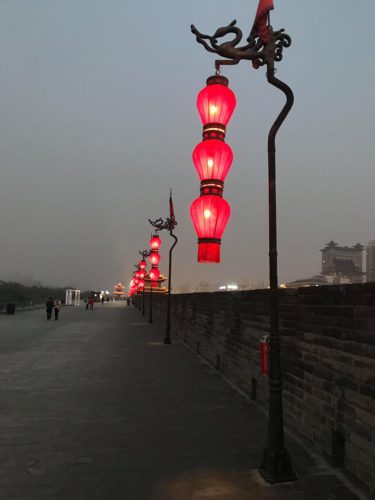
What do you do when you are not teaching?
My husband and I are bloggers, so we tend to spend a lot of our free time blogging. We live next to the river so enjoy taking weekend strolls along the river, trying some of the local food in the area and visiting new restaurants. During the school holidays, we love to travel. During the winter, we were able to visit Harbin’s Ice Festival and that was amazing!
Do you have any bad experiences teaching in China?
The main challenge I find is parent expectations. China public schools have longer days and a lot of homework. In China, the expectation is for children to go to school throughout the day and then do academy and tutoring until late in the evening. It is difficult when parents want you to provide the same amount of homework when it isn’t something I personally agree with when children are so young. Every time I have a parent’s evening, I have at least one parent tell me I need to be stricter with their student and that I must “yell at them”. I agree with having rules, but I am not a strict, yelling teacher because that’s not how kids learn.
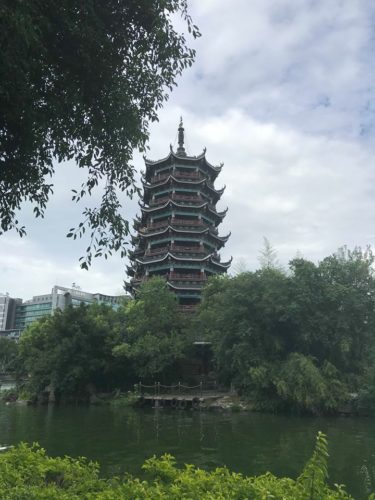
Personal experiences
What advice would you give to someone thinking about teaching in China?
Do your research on the city and the school. Some schools have a high turnover and aren’t run as well as others. Check reviews on International Schools Review to research the school and try to find as much information about your chosen city in China. We have mini-guides to most of the major cities on our website, but your main aim is to see how many ex-pats there are in the city; especially if you are moving by yourself.
What did you do to prepare to move abroad?
We shipped all our personal belongings ahead of time and tried to learn as much as we could about Tianjin. We bought face masks to protect us from pollution and checked out the weather throughout the year, so we could pack appropriately. And we learned about odd things that China wouldn’t have readily available; the toothpaste we liked and deodorants, we bought excessive amounts to pack. Imodium was our lifesaver in the first few months here. Dry shampoo also doesn’t exist here, so I stocked up.
What is the most rewarding part of your job?
The children. They are eager to learn and because we have such small classes, you really get to know every single child so well. You can cater learning to them individually and can see progress made every day.
Any other comments that you would like to add?
China is an amazing place to live and travel, but it isn’t easy. When you arrive, buy yourself an air humidifier to avoid drying your skin out and if you’re there for a while, get yourself an air purifier. Polluted days can give you headaches and make you feel tired and even anxious so just be aware of that. But the people in China are amazing. The culture is rich and varied, the food is unusual but most delicious, and travel here offers everything from glorious beaches to bustling cities, scenic landscapes to stunning temples. I will always encourage people to travel to China, there really is no place like it.
Meet the guest bloggers
We hoped you enjoyed this post about living in Tianjin as a teacher and we hope you are inspired to set the wheels in motion and jet off for a life in Asia. Or, find out what living and teaching in Spain is like. Or, check out what it is like to teach in Seoul.

Katie & Calum: Katie and Calum are British ex-pats, currently living in Tianjin, China. We love to try new food, enjoy romantic experiences and see the local life of any destination we visit. We love working abroad and sharing our ex-pat tips on Creative Travel Guide. For full guides visit our Youtube channel. For weekly vlogs of life, teaching and travel in China, watch This is Katie.
Like this post? Pin it!


Hy. I would like to contact you? Can you provide me some contact information. Thank you
Hi Alina, If you are looking for information in regards to teaching in Tanjin/ China specifically, you can contact the guest blogger via her social media chanel which are linked at the end of the post. If you need help with teaching abroad in general, you can find all of our contact details on the contact page, which you can find in the main menu.